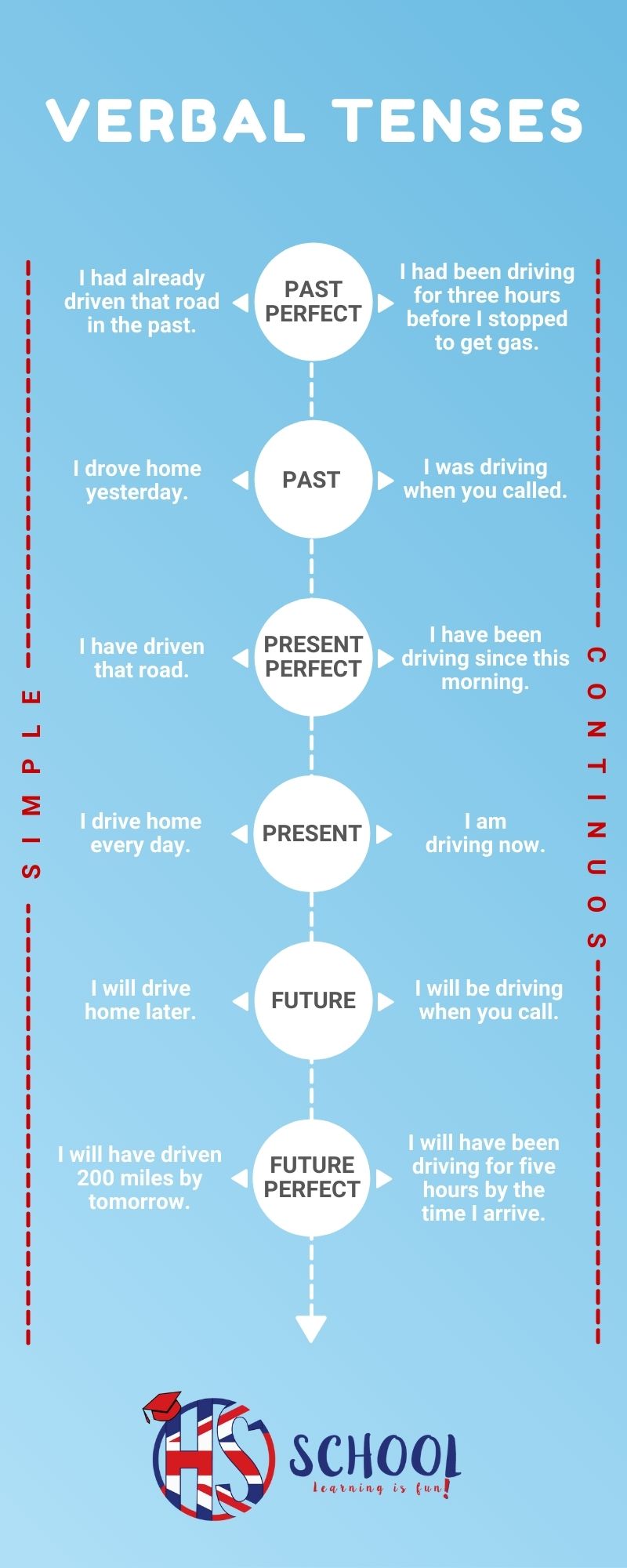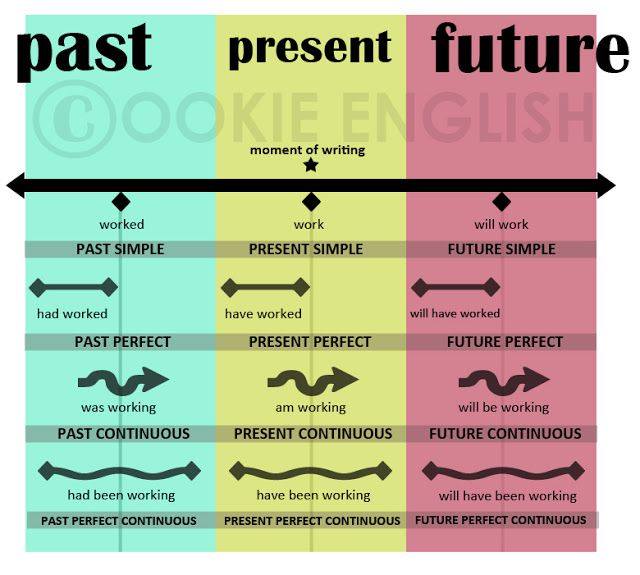
English... my way Grammatica inglese, Tempi verbali inglesi, Inglese
Tempi verbali italiani e inglesi Italiano Inglese Uso Esempi Presente Present Simple affermazioni generali Vivo a Parigi. 1 live in Paris. azioni abituali Andiamo in Irlanda ogni anno. We go to Ireland every year. azioni future certe // trimestre fmisce a giugno. The term finishes in June. Present Continuous azioni contemporanea all'atto del.

tenses timeline Tempos verbais inglês, Tempos verbais, Dicas de ingles
Tempi Verbali Inglesi Present Simple = presente semplice Richard is a barman, and he works in a pub. He usually works from 8 pm till 1 am. (affirmative) (Richard è un barman, e lavora in un pub. Lui di solito lavora dalle 20 fino all'una.) Does Richard work in a pub? (interrogative) Richard does not (doesn't) work in a pub. (negative)

Pin di Maria Jose Diaz Holloway su English Grammatica inglese, Tempi
Preparati con lezioni e prove svolte basate sui programmi universitari! Rispondi a reali domande d'esame e scopri la tua preparazione. Studia con prove svolte, tesine e consigli utili. Togliti ogni dubbio leggendo le risposte alle domande fatte da altri studenti come te. Ottieni punti download per ogni documento condiviso.

IL VERBO AVERE MODO INDICATIVO Lezioni di grammatica, Attività di
Schema dei tempi in inglese Grammatica I tempi Schema dei tempi Simple Present Present Progressive Simple Past Past Progressive Present Perfect Simple Present Perfect Progressive Past Perfect Simple Past Perfect Progressive Future Simple (will) Future Simple (going to) Future Progressive Future Perfect Simple Future Perfect Progressive

Pin by marika daniele on English Verb tenses, English verbs, English
TO LIKE = I LIKED (4) VERBO ESSERE DOPO IL CONDIZIONALE In inglese il modo congiuntivo NON esiste, ma si usa il SIMPLE PRESENT o il SIMPLE PAST secondo il bisogno. Il verbo BE è l'unico ad avere una forma congiuntiva al passato: IF I WERE IF YOU WERE IF HE WERE IF SHE WERE IF IT

Schema dei tempi verbali inglesi e i loro corrispondenti in italiano
Present Simple = presente semplice Richard is a barman, and he works in a pub. He usually works from 8 pm till 1 am. (Richard è un barman, e lavora in un pub. Lui di solito lavora dalle 20 fino all'una.) Does Richard work in a pub? Richard does not (doesn't) work in a pub. (affirmative) (interrogative) (negative) Present Progressive

Maşină de scris curaj batistă forme verbali inglese fiu Geografie marţi
This book, aimed at teachers and students of all ages, explains all the basic grammar points of English in Italian from beginner to intermediate level. Examples are in English, each grammar point has practice exercises, the answers are at the end of the book. The appendix contains 8 more topics and instruments in English and Italian for.

Verbi inglesi English words, Learn english, Learn english words
ÐÏ à¡± á> þÿ Y.

English Grammar Tenses, Teaching English Grammar, English Grammar
Tempi verbali inglesi - Frasi d'esempio Presente Simple present: I drive home every day. Present continuous: I am driving now. Present perfect: I have driven that road. Present perfect continuous: I have been driving since this morning. Passato Simple past: I drove home yesterday. Past continuous: I was driving when you called.

Schema dei tempi verbali inglesi e i loro corrispondenti in italiano
Schema dei tempi verbali inglesi | Schemi e mappe concettuali di Inglese | Docsity Prepara i tuoi esami Studia grazie alle numerose risorse presenti su Docsity Prepara i tuoi esami con i documenti condivisi da studenti come te su Docsity I migliori documenti in vendita da studenti che hanno completato gli studi

Easy English Grammar, English Grammar Tenses, English Verbs, Learn
I tempi passata sono usati per parlare di qualcosa che ha avuto inizio ed è terminata nel passato, o di cose iniziate nel passato ma ancora in essere nel presente. In inglese ci sono diversi modi di parlare del passato: Migliora la tua grammatica inglese, il vocabolario e altro ancora con EF English Live. Iniziare Past Perfect Simple

Maşină de scris curaj batistă forme verbali inglese fiu Geografie marţi
Che si stanno svolgendo in questo preciso momento; Che avvengono temporaneamente in un periodo di tempo limitato; Che sono programmate nel futuro, insieme a complementi di tempo come "tomorrow", "next year", "tonight", etc. Come si forma: Simple Present dell'ausiliare ' be ' + verbo in -ing. Esempio: "I am playing cards with.

Per usare correttamente i tempi verbali in inglese, è più facile
Download now of 3 Tempi verbali & frasi ipotetiche Inglesi e loro corrispondenti in Italiano ENGLISH Present Simple = Azioni abituali / realt I go to school, he works. I am Italian, he is English. Present Continuous = azioni di questo momento / periodo I am going to school (now). ITALIANO Presente (semplice) Io vado a scuola, lui lavora.

Verbo Can, Learning Italian, English Study, Orlando, Language, Teaching
you 108108 M 1 Sostantivi, articoli, pronomi, aggettivi ronomi Personali soggetto i you he she it we they me him her us you them comPlemento il Plurale dei sostantivi -s, -ss, -ch, -sh, -o, -x, -z: bus buses class classes tomato tomatoes wat ch wat es dish dishes box boxes -o (di origine straniera): piano pianos con una consonante + -y: baby babies country countries -f, -fe:.

Principali tempi verbali inglesi Docsity
Esistono quattro tempi verbali in inglese per parlare del presente: il present simple, utilizzato per abitudini e situazioni generali; il present continuous, per azioni in corso; il present perfect, per azioni passate con effetti nel presente; e, infine, il present perfect continuous, per azioni iniziate nel passato e ancora in corso nel presente.

Tempi Verbali In Inglese La Guida Completa Inglese Dinamico
PRESENT SIMPLE FORMA INTERROGATIVA DO/DOES + SOGGETTO + FORMA BASE DEL VERBO ESEMPIO: Do you go to school? - Does he go to school? FORMA NEGATIVA SOGGETTO + DON'T/DOESN'T + FORMA BASE DEL VERBO ESEMPIO: I don't go to school - He doesn't go to school FORMA PASSIVA VERBO ESSERE al PRESENTE + PARTICIPIO PASSATO